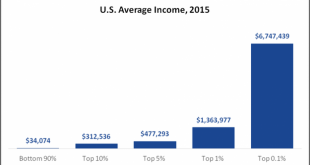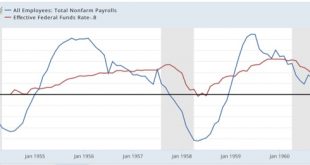from Lars Syll After the 1920s, the theoretical and methodological approach to economics deeply changed … A new generation of American and European economists developed Walras’ and Pareto’s mathematical economics. As a result of this trend, the Econometric Society was founded in 1930 … In the late 1930s, John Maynard Keynes and other economists objected to this recent “mathematizing” approach … At the core of Keynes’ concern laid the question of methodology. Maria Alejandra Madi Keynes’...
Read More »Whose sweet spot?
from David Ruccio Economic journalists, like Neil Irwin, are falling all over themselves celebrating the strength of the current economic recovery. According to the latest data from the Bureau of Labor Statistics, 313 thousand new jobs were added in February. The official unemployment rate remained at a relatively low 4.1 percent. Hourly wages grew at an annual rate of 2.6 percent. And so on. Here’s Irwin: This is not the kind of data you expect in an expansion that is nine years old,...
Read More »“Let’s pretend that people are like molecules”
“Social researchers of the 19th century were impressed by the success of this branch of science [thermodynamics], and also by its similarity to economics. A gas is a macroscopic thing, characterized by macroscopic properties — temperature, pressure, volume. But it consists of many microscopic constituents (molecules) whose interactions collectively create the macroscopic state. The study of macroscopic properties arising from microscopic interactions is called statistical mechanics. That...
Read More »Friedman’s methodology: a stake through the heart of reason
from Asad Zaman Romer writes that macro-economists casually dismiss facts, and the profession as a whole has gone backwards over the past few decades, losing precious and hard-won knowledge. He does not consider WHY this happened. What are the methodological flaws that create the possibility of moving backwards, losing knowledge, affirming theories known to be in conflict with facts. How is it that leading economists can confidently assert theories which border on lunacy, and receive...
Read More »Steel tariffs and doctors: a teachable moment?
from Dean Baker Donald Trump’s tariffs on steel have elicited near universal condemnation. In addition to issuing warnings from retaliation by our trading partners, the media have also been giving us economics lessons on how steel tariffs will mean higher prices for consumers. If we pay 10 percent more for our steel, then the price of cars and other items that use large amounts of steel can be expected to rise. This will reduce demand for these products and might cause consumers to buy...
Read More »Open thread March 13, 2018
How money is created
from Lars Syll Everything we know is not just wrong – it’s backwards. When banks make loans, they create money. This is because money is really just an IOU. The role of the central bank is to preside over a legal order that effectively grants banks the exclusive right to create IOUs of a certain kind, ones that the government will recognise as legal tender by its willingness to accept them in payment of taxes. There’s really no limit on how much banks could create, provided they can find...
Read More »U.S. Average Household Income, 2015
Source: Emmanuel Saez, UC Berkeley
Read More »Utopia and healthcare—1
from David Ruccio This is the first in a series of blog posts on the utopian dimensions of healthcare. I’ve written quite a bit about the U.S. healthcare dystopia over the years—including a seven-part series back in 2016.* But I haven’t yet addressed the utopian dimensions of healthcare reform. The appearance of the new issue of Jacobin Magazine, titled “The Health of Nations,” is a good occasion to start that discussion. Adam Gaffney starts with much the same question that provoked my...
Read More »Interest rates and jobs: a variation on the model
Interest rates and jobs: a variation on the model Friday is nonfarm payrolls day, so in the absence more noteworthy economic news, let me follow up on Monday’s post in which I discussed “A simple model of interest rates and the jobs market.” In it, I suggested that: 1. a YoY increase in the Fed funds rate equal to the YoY% change in job growth has in the past almost infallibly been correlated with a recession within roughly 12 months. 2. the YoY...
Read More » Heterodox
Heterodox





